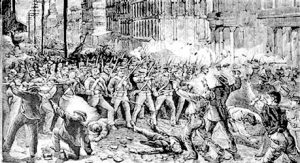US Railway Workers Confront the Capitalist State. Let’s Mobilize the Mighty Industrial Working Class for Communist Revolution
USA, December 7— President Biden and Democrats in Congress used a century-old law to squash a nationwide railroad strike set for Friday, prohibiting workers from walking out for a meager seven days of paid annual sick leave. The US is the only industrial nation that doesn’t guarantee any paid sick leave at all.
So much for the Democrats’ hypocritical claims to be “pro-labor” and “pro-health care”! Even most “Progressive” Democrats (including most of the “Squad”) voted to impose a contract the workers had already rejected. “We have to protect the economy” (not the workers!) they whined. This is their democracy in action.
A union leader complained that this “takes away the strength and ability that we have.” That’s because trade unions bow to the capitalist state and its laws. Communists organize to smash them.
As we go to press, it’s not clear whether any groups of railroad workers will wildcat (strike illegally without union approval). If they do, we applaud their courage! But strikes can’t break the stranglehold of finance capitalism over the US government and our lives. Only communist revolution can do that.
If strikers openly opposed capitalist wage slavery, if they called for a communist world without money, borders, or nations, they would inspire the international working class. ICWP industrial comrades should work toward organizing actions like that to build the Party nationally bring us closer to the revolution we need.
Finance Capital Forces Railroads to Maximize Profits on Workers’ Backs
After Congress partially deregulated the rail-freight industry in 1980, competition among railroad companies increased. Businesses paid less to ship their goods, and rail began to win back market share from trucking. But the law of capitalism is “eat or be eaten.” The thirty-three large railroads that existed in 1980 have now merged into just seven that control 80% of the market.
The rail industry reported record profits in 2021 and expect even fatter ones this year. Seven paid sick days per year would barely make a dent. That’s not the main issue at stake for the railroad bosses. They need to maximize profits to satisfy the demands of the finance capitalists (Wall Street and hedge-funds) that own them.
Wall Street pressures railroads to prioritize cost-cutting over investment and growth. That’s why one-third of railroad jobs have disappeared: to provide stockholders with $191 billion dollars from 2011-2021
Remaining workers are subjected to a new bare-bones work-rule system called Precision Scheduled Railroading. Understaffing is part of the plan, and the reason the bosses are holding the line against paid sick days. They’d rather raise pay and make other concessions to maintain their “ultra-lean” and “ultra-flexible” business model.
That’s the model Congress is imposing. As a worker explained, “now all of a sudden, you can get called out of the blue to go to work fifteen minutes from now because they need somebody to fill a train.”
Monopoly capitalism – Finance capitalism – Imperialism. That’s what the rail workers and all of us are up against. That’s why we need communist revolution.
In communism, workers (organized as a mass International Communist Workers’ Party) will collectively make all decisions relating to our work. Sometimes (while we are still fighting for power, and during emergencies) we will volunteer to work long and hard hours. But it will be for the benefit of the masses, not for some bosses’ profits, and it will respect individual needs.
As global communism develops fully, all will have meaningful work, opportunities to learn and grow, and the resources we need to live healthy productive lives.

“The great strike—The Sixth Maryland Regiment fighting its way through Baltimore.”
In the summer of 1877, a nationwide strike brought the US to a halt. Eighty thousand railroad workers went on strike. Hundreds of thousands of workers joined in solidarity, angry at the misery of a four-year-long depression. Police, state militia, and federal troops battled strikers in dozens of cities and towns. They killed more than one hundred and wounded thousands.
Workers, inspired by the 1871 Paris Commune and recovering from a devastating Civil War, attacked the railroads and capitalism itself. “Capital has overridden the Constitution,” said one St. Louis worker. “Capital has changed liberty into serfdom, and we must fight or die.”
President Rutherford B. Hayes, a former Civil War Major General and leader of the pro-capitalist Republican Party, was a friend of the railroad owners. Hayes had just become president in March by making a deal: he bought the electoral votes of three southern states by agreeing to withdraw federal troops from the South. This deal ended Reconstruction and opened the floodgates of racist terror in the post-Civil War South.
Now he sent federal troops to break the railroad strike. Hayes’ action showed the naked rule of capital over labor and set a precedent for future strikes: federal troops and court injunctions became powerful weapons for the capitalist class.

